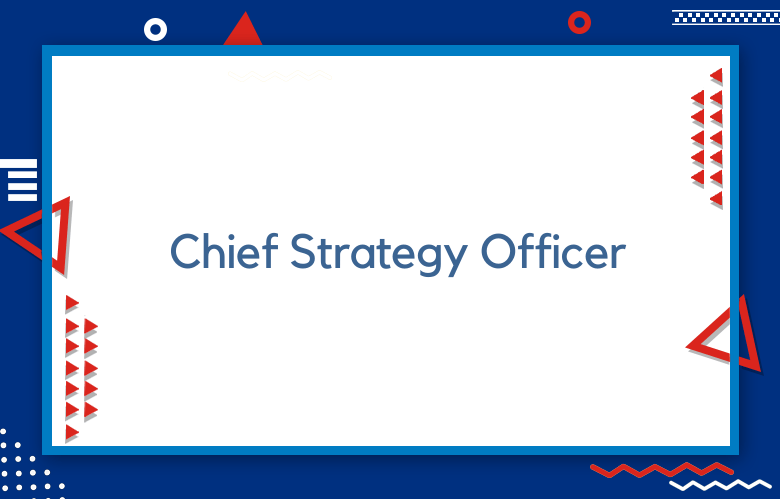Chief Strategy Officer: Benefits of having a Chief Strategy Officer on staff

Do you have a strategic mindset? Do you understand the value of innovation and creativity in business? Would you like to take your career to the next level with an opportunity that will utilize both your skills and passions? If so, then become a Chief Strategy Officer.
Are you a C-level executive who is looking to take on a new role? Maybe you’re going back to school and want to pursue a marketing degree. Or perhaps your current company isn’t the right fit for where you want your career to go.
Whatever it is, there are many reasons why someone would be interested in becoming a chief strategy officer. But what does this job entail? That’s what I’m here for! Read on as I tell you everything about the top strategy officer position so that you can decide whether or not it’s right for you!
Many people have a misconception that the Chief Strategy Officer is just a figurehead. In reality, they are an integral part of the company and play a significant role in strategic decision-making. They also guide other employees on how to make decisions based on their expertise.
What is the Chief Strategy Officer (CSO)?
“Chief Strategy Officer (CSO) is one of the top positions in a company. As the head of strategic planning, it falls to them to plan for future growth and revenue streams.”
CSO is the executive who oversees all aspects of an organization’s strategy. This person ensures the company makes changes to stay relevant in a rapidly changing market.
The Chief Strategy Officer is a member of the top management team responsible for developing and communicating the organization’s long-term vision, mission, and values.
The Chief Strategy Officer is the head of a company’s strategic planning. They are in charge of designing the plan that will guide the business, innovate their products and services, manage their budgets, and improve overall performance.
A Chief Strategy Officer is a high-level executive responsible for developing and implementing a company’s strategic plan.
The qualities of an effective Chief Strategy Officer
- Must have good strategic thinking skills
- Must be able to work with a variety of people and organizations
- Must be able to identify, evaluate, and prioritize business opportunities for the company
- Ability to make decisions quickly when needed
- Ability to think strategically
- Strong analytical skills
- Excellent communication skills
- Good organizational skills
- Ability to work across teams and departments
- Must have a strong understanding of the company’s business model
- Must be able to anticipate and solve problems before they occur
- The ability to see trends in the market and predict future developments is key
- Must have good communication skills, both verbal and written
- Understand the company’s vision and mission
- Keeps up with industry trends to stay relevant
- Communicates effectively, both verbally and in writing
- Sets goals for the company, as well as individual employees
- Is a team player who is committed to collaboration
- Understand the company’s culture and values
- Knows how to create a vision for the future of the company
- Has an understanding of what is going on in the industry
- Can articulate a clear strategy that aligns with both short-term and long-term goals
- Communicates effectively, including with stakeholders inside and outside the organization
Benefits of having a Chief Strategy Officer on staff
- A Chief Strategy Officer can help your company grow
- They are experts in strategy and will be able to help you make the right decisions
- The CEO doesn’t have to worry about strategic planning because they are focusing on other aspects of the business, like operations and finance
- A Chief Strategy Officer can help your company stay ahead of the curve
- The CSO can act as a liaison between different departments within the organization, helping to increase communication and productivity
- The CSO can improve organizational efficiency by making sure that all departments are working together toward the same goal
- A Chief Strategy Officer will help you think about your business’s long-term goals
- They can provide a fresh perspective on the company and its customers
- They’ll be able to identify risks that could threaten the company’s success
- CSOs can also map out possible solutions for those risks—and what it would cost to implement them
- A Chief Strategy Officer can develop strategies for the company
- The strategy officer will make sure the company is always looking ahead to stay competitive in the industry
- They can help with branding and marketing, which are crucial in today’s world of business
- They have a degree in organizational behavior or finance, so they know what it takes to be successful
- A chief strategy officer can help you find new ways to grow your company
- They can identify and evaluate opportunities for growth, as well as develop a plan to reach those goals
- A CSO will be able to take on some of the responsibilities of other executives to free up their time so they can focus on what’s most important
- A CSO is an expert in assessing trends and identifying future risks or opportunities
What is the Chief Strategy Officer’s role in an organization?
- The Chief Strategy Officer oversees the company’s strategic planning
- They are responsible for setting goals and developing a plan to reach those goals
- They typically work with senior management, including the CEO, CFO, and other executives
- The CSO is tasked with developing and implementing an organization’s strategy
- They are responsible for the company’s vision, culture, and values
- They also serve as a liaison between employees and management
- Developing and executing the organization’s strategy
- Leading the strategic planning process
- Working with senior management to ensure that their strategy is aligned with organizational objectives
- Defining, communicating, and monitoring performance against agreed-upon goals
- Developing the company’s long-term strategy
- Leading and overseeing day-to-day operations
- Ensuring that all aspects of the business are aligned with the company’s strategic plan
- Overseeing and implementing changes to ensure alignment with company goals and objectives
- The CSO is responsible for the company’s long-term vision and strategic direction.
- They are also involved in developing a company’s business strategy, including setting goals and objectives.
- The CSO oversees the organization’s risk management process to avoid problems that could lead to significant losses or opportunities that could create significant gains.
The responsibilities of a Chief Strategy Officer
- Develop a company’s strategy
- Provide leadership and direction to other employees
- Communicate with stakeholders, including investors, customers, suppliers, and partners
- Manage the company’s finances
- Develop strategic goals for the company
- Work closely with other executives to create a cohesive vision and strategy.
- Identify new opportunities, monitor trends in the marketplace, and provide feedback on potential threats or opportunities.
- Create an annual business plan that aligns with the company’s vision and strategy.
- Communicate plans to stakeholders internally as well as externally
- The Chief Strategy Officer is responsible for managing the company’s long-term strategy
- They are responsible for making sure that the company has a plan to grow and develop in a way that ensures it stays relevant and competitive
- They have to be able to work with the CEO, CFO, and other executives of the company
- They need strong leadership skills so they can lead their team effectively
- Ensure that the company is meeting its goals
- Develop and implement long-term strategies for the organization
- Lead a team of strategists to develop and execute strategic initiatives
- Collaborate with other executive teams and key stakeholders to ensure alignment with corporate strategy
- Identify ways to improve performance, efficiency, and value creation
- Develops the company’s long-term strategy
- Oversees financial, operational, and human resource management
- Sets the direction for all business functions at a company or organization
- Works with senior-level executives to provide strategic advice on significant issues.
Conclusion
We all know that marketing is a critical part of the business. But many small businesses don’t have the resources to hire an in-house Marketing Manager, and they may not even be aware of how much they need one! A Chief Strategy Officer can fill this gap by overseeing your entire digital strategy (including SEO) and providing research on what campaigns work best for you or your customers.
If you want someone with expertise who can help turn your website traffic into sales, contact me today to discuss my services for managing outbound efforts like advertising and content marketing.
As you see, there are several benefits to having a Chief Strategy Officer on staff. Having someone who is solely focused on analyzing your company’s marketing strategy and advising the CEO or General Manager may be just what you need to take your business to the next level. If this sounds like something that would benefit your organization, contact me for more information about how I can help implement these changes in our Marketing department.
Call: +91 9848321284
Email: [email protected]



